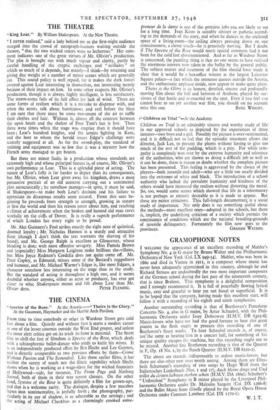THE THEATRE
„King Lear." By William Shakespeare. At the New Theatre.
" I NEVER realised," said a lady behind me as "thefirst-night audience merged into the crowd of autograph-hunters waiting outside the theatre, " that the two wicked sisters were so lecherous." Her com- ment indicates one of the great virtues of Mr. Olivier's production. The plot is brought out with much vigour and clarity, partly by careful handling of the cryptic exchanges and " ocillades " on which so much of it depends, but mainly—I think—by retaining and giving due weight to a number of minor scenes which are generally cut. This sound policy is well repaid, for it makes the dark forces arrayed against Leaf interesting in themselves, not interesting merely because of their impact on him. In some other respects Mr. Olivier's production, though it is always highly intelligent, is less satisfactory. The storm-scene fails of its full effect for lack of wind. There are some forms of realism which it is a mistake to dispense with, and when the actors talk about hurricanoes and reel before the blast I am sure that there must be some movement of the air to ruffle their clothes and hair. Without it, almost all the contrast between the open heath and the shelter of Poor Tom's but is lost. Then there were times when the stage was emptier than it should have beenLear's hundred knights, and the armies fighting in Kent, and the host to whom the herald issues Edgar's challenge were scarcely suggested at all. As for the sword-play, the standard of training and equipment was so low that it was a mystery how the French army managed to get beaten.
But these are minor faults in a production whose standards are extremely high and whose principal feature is, of course, Mr. Olivier's own performance as Lear. This is a splendid piece of acting. The nature of Lear's folly is far harder to depict than its consequences, but Mr. Olivier, when Lear gives away his kingdom, draws a most persuasive portrait of an old autocrat carrying out a sentimental plan autocratically ; he somehow manages—in spite, it must be said, of Shakespeare—to make both Lear's decision and his failure to appreciate its disastrous results seem natural. From this sure be- ginning he proceeds from strength to strength, growing in stature as first the world and then his reason totter about him, and reaching a climax of achievement when the broken and hunted old man raves wistfully on the cliffs of Dover. It is really a superb performance of which London has every right to be proud.
Mr. Alec Guinness's Fool strikes exactly the right note of quizzical, doomed loyalty ; Mr. Nicholas Hannen is a sturdy and attractive Kent (though I don't think the text warrants the shaving of his beard), and Mr. George Ralph is excellent as Gloucester, whose blinding is done with most effective savagery. Miss Pamela Brown and (especially) Miss Margaret Leighton make brilliant she-villains, but Miss Joyce Redman's Cordelia does not quite come off. Mr. Peter Copley, as Edmund, misses some of the Bastard's ruggedness and humour, and Mr. Michael Warner's Edgar is, like most Edgars, a character somehow less interesting on the stage than in the study. But the standard of acting is throughout a high one, and it seems doubtful whether anyone, either as actor or producer, has ever got closer to what Shakespeare meant and felt about Lear than Mr.


























 Previous page
Previous page